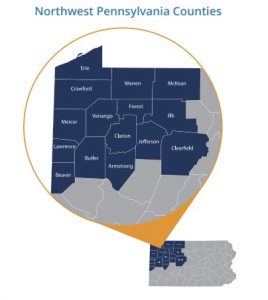 The Northwest Pennsylvania (NW PA) Veteran Suicide Prevention Program operates on a three-pronged approach involving healthcare providers, community organizations, and Veterans and their families in the 15 counties of NW PA. As many Veterans ages 60+ live within our 15-county region, we are sharing information from VA about how aging affects PTSD. In addition to the resources provided below, our Community Toolkit, which is free to download and share, also provides county-specific information that may be useful to Veterans and their families.
The Northwest Pennsylvania (NW PA) Veteran Suicide Prevention Program operates on a three-pronged approach involving healthcare providers, community organizations, and Veterans and their families in the 15 counties of NW PA. As many Veterans ages 60+ live within our 15-county region, we are sharing information from VA about how aging affects PTSD. In addition to the resources provided below, our Community Toolkit, which is free to download and share, also provides county-specific information that may be useful to Veterans and their families.
If you have any questions or would like to speak with someone about publicizing the NW PA Veteran Suicide Prevention Program in your community, please reach out to us.
Read time: 4 minutes
View the original article on VA’s website
Managing PTSD While You Age
 Over the years it has been known as shell shock, combat fatigue, or battle fatigue. Today, it’s commonly known as posttraumatic stress disorder or PTSD. Although PTSD is often linked with combat, not all PTSD is combat-related. Any experience that threatens your life or someone else’s can cause PTSD.
Over the years it has been known as shell shock, combat fatigue, or battle fatigue. Today, it’s commonly known as posttraumatic stress disorder or PTSD. Although PTSD is often linked with combat, not all PTSD is combat-related. Any experience that threatens your life or someone else’s can cause PTSD.
How aging affects PTSD
Some changes that come with normal aging may make you feel more vulnerable. This can make your PTSD symptoms more noticeable. Aging can cause symptoms to come back after many years or even occur for the first time. These common life changes can affect PTSD:
- Self-reflection: Sometimes when looking back at your life, memories you had forgotten or bottled up may return.
- Retirement: With more time on your hands, unpleasant memories may surface more.
- Loss: The death of a spouse, partner, or friend can make you feel alone and unsafe, leaving you vulnerable to PTSD.
- Physical ability: You may lose strength, making you feel like you can’t protect yourself.
- Change in the environment: Spending time in unfamiliar places, like a new home, can upend your daily routine and make you feel less safe.
- More screen time: You may be watching more TV. The news and war scenes may cause you to relive memories.
- Medical problems: Hospital stays, chronic illness, and end-of-life issues can make you feel weaker and more fearful. PTSD symptoms may increase.
Get help at any age
Remember: it’s never too late to heal. If you have symptoms of PTSD, don’t wait to ask for help. Many treatments are proven to work, and VA offers almost 200 programs, including these options:
- 1-to-1 mental health assessment and testing
- Medicine for treating PTSD
- 1-to-1 psychotherapy (also called talk therapy), which includes Cognitive Processing Therapy
- 1-to-1 family therapy
- Group therapy for particular trauma-related issues, like anger or stress management, or combat support
- Group therapy for those who served in certain combat zones or have been through similar traumas
Looking to Get Involved?
 Whether you identify as a healthcare provider, community organization, or Veteran, there are several opportunities through the NW PA Veteran Suicide Prevention Program and PERU to connect to resources, participate in educational training, and promote harm reduction strategies. We are actively recruiting healthcare and community partners to work with us in meeting our goals and objectives. To learn more, visit the program website at theresilientveteran.org.
Whether you identify as a healthcare provider, community organization, or Veteran, there are several opportunities through the NW PA Veteran Suicide Prevention Program and PERU to connect to resources, participate in educational training, and promote harm reduction strategies. We are actively recruiting healthcare and community partners to work with us in meeting our goals and objectives. To learn more, visit the program website at theresilientveteran.org.
Need Help? Know Someone Who Does? Contact the National Suicide Prevention Lifeline at 988 or use the online Lifeline Crisis Chat. Both are free and confidential. You’ll be connected to a skilled, trained counselor in your area.

